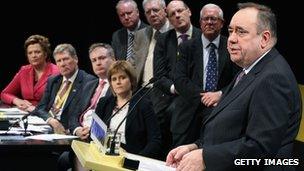Challenge ahead as SNP conference gathers
- Published

SNP ministers have been buoyed by May's Scottish election result
When the Scottish National Party secured its historic election win in 2007, it always knew forming Holyrood's first minority government was going to be tough.
Ministers found themselves having to work with opposition politicians, as key policies such as the independence referendum (more on that later) were dropped through a lack of support.
But, as we now know, the SNP used its previous term in office as a springboard to achieve a feat unmatched by any other party since devolution - the formation of Scotland's first majority government.
The SNP will tell you its mantra of "team, record and vision" was front-and-centre of this victory - that was an important factor - but the party also managed to capitalise on the misfortunes of its political rivals to seal the deal with voters in May.
And since first taking office, the party of government says it has proved its worth by safeguarding NHS spending, protecting Scots students from university tuition fees and maintaining the 1,000 extra police officers it put on the streets.
Labour, as the party now largely acknowledges, spent the election looking back instead of forward, while the Liberal Democrats, slashed back from 16 MSPs to five, "paid the price", as it has been put, for going into coalition with the Conservatives at Westminster.
However, having achieved a result which Scottish devolution was never really designed to support - one party gaining an overall majority - is the SNP now finding itself in more difficult territory?
If you take the Scottish Parliament as an example, the SNP's dominance is clear - they have the most MSPs, most influence in the committees and elected one of their own as presiding officer, albeit the post is strictly politically neutral.
Alex Salmond is all too aware of this issue, which is why he has said from day one that the SNP does not have "a monopoly of the wisdom".
But he still has the luxury of being able to pass policies, such as minimum pricing for alcohol, which lacked support during the government's previous term.
The overarching story of this five-year parliament will centre around two issues - the affect of spending cuts on the economy and the forthcoming independence referendum.
But, in the meantime, the Scottish government is having to deal with the thing so feared by former Tory PM Harold Macmillan: "Events, dear boy, events".
Scotland's problems with bigotry and sectarian-related hate crime, much of it related to football, are historic and deep.
Escalating trouble at Rangers v Celtic games, coupled with a court case in which two men have been accused of a plot to kill Celtic manager Neil Lennon and two high-profile fans of the club, forced ministers to act.
The result was a bill aiming to stamp out abusive behaviour, whether fans are watching matches in a stadium, in the pub or commenting online, by bringing in new jail terms of up to five years.
But it has not been an easy ride for the government.
First, its plan to rush the laws through parliament in time for the new football season was dropped, as church and supporters' groups claimed not enough people were getting a say on the plans, and there has also been confusion over what might constitute a sectarian offence.
Scotland's top prosecutor, Lord Advocate Frank Mulholland, moved to clarify the singing of the national anthem at football games would not be seen as illegal without an "aggravating" factor, after an earlier remark from Community Safety Minister Roseanna Cunningham that each case would depend on individual circumstances.
And the first minister's goal of winning backing from all the Holyrood parties to support the legislation was dashed when Labour, Tory and Lib Dem members refused to approve it as it stood.

Football-related hate crime has been a tough issue for the SNP government to handle
Of course, the bill will be passed and Mr Salmond says it is the "right thing to do".
But perhaps this is one of those cases where the SNP possibly feels it does have a monopoly on wisdom, at least in the Holyrood chamber anyway.
And if the issue of hate crime has polarised opinion outside the party - does the issue of gay marriage have the potential to do the same inside it?
As a self-styled progressive political movement, it was a virtual no-brainer that the SNP backed a consultation on bringing in gay marriage in Scotland.
But a parliamentary motion tabled by SNP MSP John Mason stating no person or organisation should be forced to be involved in or to approve of same-sex marriage sparked a row within the party, with some of his colleagues saying his action encouraged discrimination.
Some have noted a throwback to the old days of the SNP, known to have publicly thrown out dissenting party members.
There is currently no serious suggestion that this approach may now come back to haunt the party, but unifying the SNP, which has been badly affected by in-fighting in the past, has been a key aim of the leadership to making it the electable force it has become in recent years.
Independence goal
One battle which definitely is taking place at the moment though is the war of governments - Holyrood v Westminster.
The SNP government has wasted little time in condemning its UK counterparts for tough budget cuts which will see Scottish spending shrink by £3.3bn - or 11% below the 2010-11 level - in the next three years.
In turn, the UK government says it is making tough decisions to cut a massive spending deficit (for which it blames Labour), and now it is time for Scottish ministers to do likewise.
There have been other spats too - the influence of the UK Supreme Court on Scots law and North Sea oil revenue flowing to the Treasury, to name but two.
Which leads on to the other big issue of the day - that of new powers for Holyrood.
The long-held view of the SNP is that Holyrood, consigned to life as a "pocket money parliament" as the party puts it, is not powerful enough to help Scotland realise its potential.
The UK government says the Scotland Bill, currently going through Westminster, will deliver the single biggest transfer of financial and other powers in 300 years.

The government is consulting on gay marriage, but not everyone in the SNP agrees with it
But the SNP's real goal, of course, is independence.
The referendum will be towards the end of the current parliament, but the party is coming under increasing pressure from its rivals to just get on with it.
Their argument is that the SNP is so scared of a "No" vote, especially in the face of action such as UK government-backed bailouts of recession-hit Scottish banks, that it wants to delay the vote until the 11th hour to maximise its chances.
The SNP acknowledges itself that not everyone backs independence, but claims support is creeping up.
Essentially though, the answer the party gives is that it is sticking to a manifesto commitment on the timetable for the referendum.
Mr Salmond has again raised the issue of a second question on the ballot paper on more Holyrood powers, with full fiscal autonomy - so-called "independence lite" - a likely option.
Again, opposition parties view this with a high degree of suspicion, with theories ranging from, "he's only doing it because Scots don't want independence" to "this will bring in independence by the back door".
Alex Salmond often talks about Scots today as the "independence generation" - indeed people may well hear about little else once the referendum campaign gets under way properly.
Depending on the outcome, the next few years may bring the SNP its greatest hour.
Then again, by the time of the next election, the party could all be over.
- Published20 October 2011